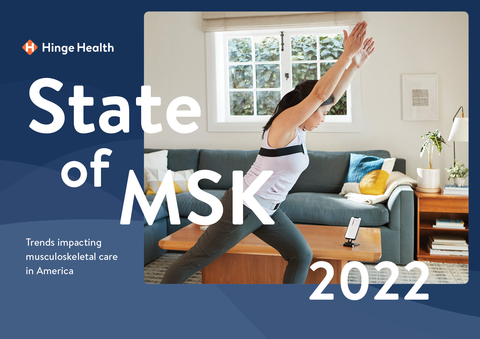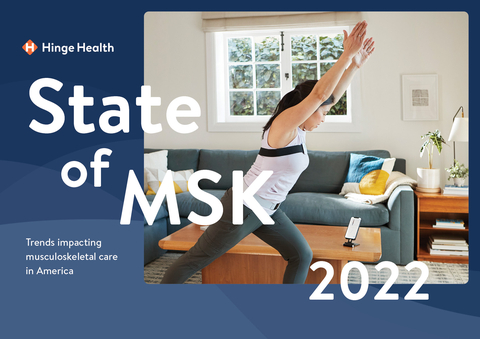SAN FRANCISCO--(BUSINESS WIRE)--Hinge Health, the world’s #1 Digital Musculoskeletal Clinic™, released its 2022 State of Musculoskeletal (MSK) Health Report revealing many pressing trends impacting MSK care in America. The report highlights care inequities based on race, gender, and location, the growing economic burden for employers, and the connection between chronic pain and mental health. The findings further underscore reducing access-to-care barriers while expanding whole-person care.
The second edition of the State of MSK Report draws on the Centers for Disease Control and Prevention’s most recent National Health Interview Survey (NHIS), representing over 252 million American adults, and other third-party data sources to provide actionable insights.
Among the key findings of the report:
- Widespread impact - One in two Americans experiences back, neck, shoulder, or other MSK pain in any given year. Almost every major industry is affected by the increasing reports of MSK pain, with some of the highest prevalences seen in professional services, wholesale and retail trade, transportation and warehousing, manufacturing, healthcare and social services, and education.
- Prevailing care inequity - People of color and lower-income populations with chronic MSK pain are more likely to experience higher pain levels, disruptions to daily life, and poor health. The lack of access to physical therapy, especially in rural areas, leads to higher rates of invasive surgery, accompanied by long recovery times.
- Growing economic burden - MSK medical claims have doubled in the U.S. over the last decade, despite the population with MSK conditions remaining relatively constant. MSK care remains one of the top three cost drivers in the U.S. health system – consuming one-sixth of employer-sponsored plan dollars and costing a staggering $600 billion to the U.S. economy. In the past year, people with MSK pain missed 8.2 days of work, more than double the average workers’ sick days. For those who experience MSK pain and mental health needs, the figure increases to 13 days.
- Undeniable chronic pain and mental health connection - Two in five people with chronic MSK pain also experience depression and anxiety. Pain can intensify mental health challenges, and conversely, anxiety and depression can worsen chronic pain. Forty percent (40%) of those with chronic pain and mental health needs aren’t getting the necessary support to make lifestyle changes that are key for recovery, and are 30% more likely to be prescribed opioids than those with chronic MSK pain alone.
- Surgery rates and costs vary widely across the country - Oregon, Kentucky, and Montana led the nation in MSK surgery rates, almost 3 times higher than the lowest rate states (New Mexico, California, and Georgia). In terms of surgery (spinal) cost, California ($28,180), Alaska ($25,294), and Wyoming ($22,162) top the list – almost 2.3 times higher than the lowest-cost states (Rhode Island, Tennessee, Arkansas).
“Chronic MSK pain, mental health, and access to care are deeply interrelated,” said Dr. Jeffrey Krauss, chief medical officer, Hinge Health. “We’re seeing that more Americans need comprehensive care, but instead receive medication or surgery. This doesn’t have to be the case. Everyone deserves best-practice care that can make a meaningful difference in the quality of life.”
The report makes five key recommendations to employers and health plans:
Understand the impact across the member population - Analyze MSK and mental health medical claims, opioid prescriptions, and segment them by zip codes to determine populations benefiting from alternative care. Launch holistic care strategies once the most vulnerable population is identified.
Treat the whole person - Go beyond physical therapy and provide an integrated clinical care team that includes doctors of physical therapy, health coaches, physicians, and orthopedists. Members receive personalized exercise therapy plans, lifestyle support, and expert second opinions in this comprehensive care environment.
Utilize digital technology to break down barriers to care - Allow members to access consistent best-practice care at home with zero deductibles and avoid unpaid time off work. Choose a digital MSK provider that offers clinically validated care via an all-in-one app, applying the latest advances in computer vision and sensor technologies to improve the member experience.
End siloed patient care - Utilize electronic medical record integration across in-person and digital care providers and help care teams intervene in real-time.
Employ solutions with proven ROI - Implement care solutions with a proven track record of engagement and impact. Drive positive economic and health outcomes with care options that are comprehensive and clinically validated.
To download the full findings of the 2022 State of MSK report, visit https://hingehealth.com/state-of-msk-report-2022-pdf
About Hinge Health
Hinge Health is building the world’s most patient-centered Digital Musculoskeletal (MSK) Clinic™. It is now the leading Digital MSK Clinic, used by four in five employers and 90% of health plans with a digital MSK solution. Hinge Health reduces MSK pain, surgeries, and opioid use by pairing advanced wearable sensors and computer vision technology with a comprehensive clinical care team of physical therapists, physicians, and health coaches. Hinge Health’s HingeConnect integrates with 1 million+ in-person providers and enables real-time interventions for elective MSK surgeries, driving proven medical claims reduction. Available to millions of members, Hinge Health is widely trusted by leading organizations, including Land O’Lakes, L.L. Bean, Salesforce, Self-Insured Schools of California, Southern Company, State of New Jersey, US Foods, and Verizon. Learn more at http://www.hingehealth.com.




